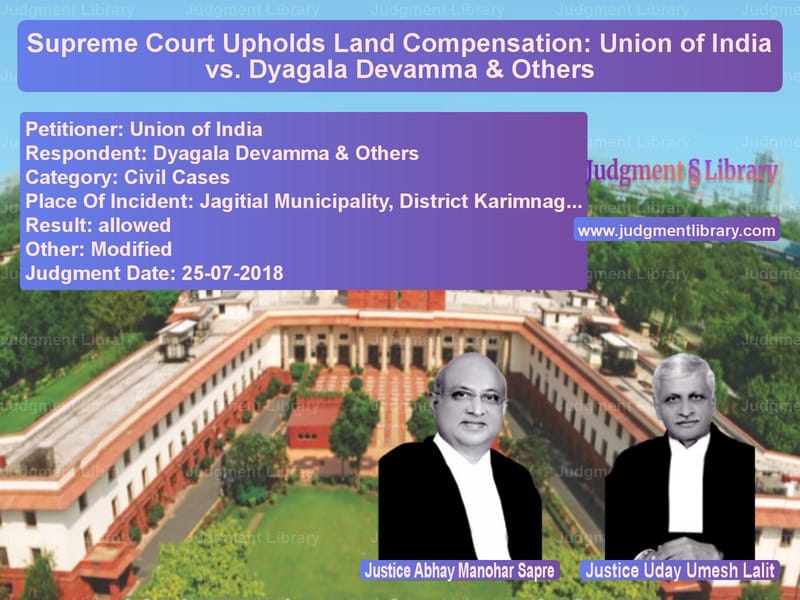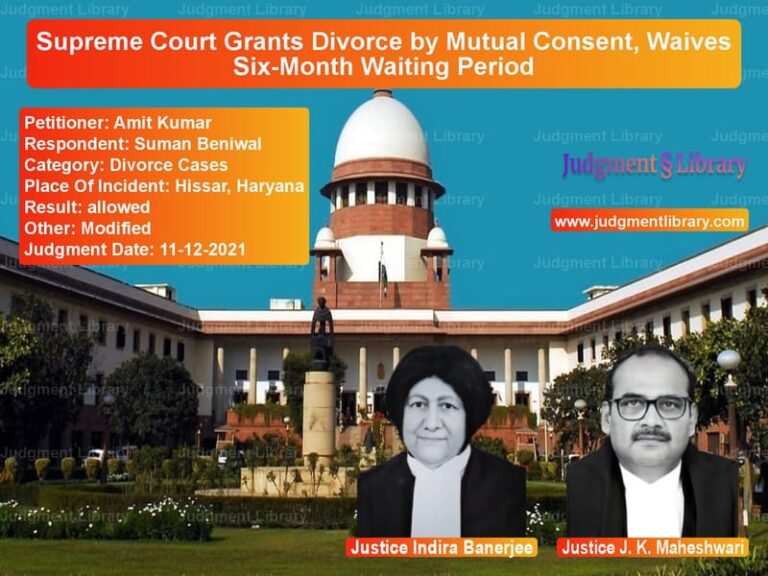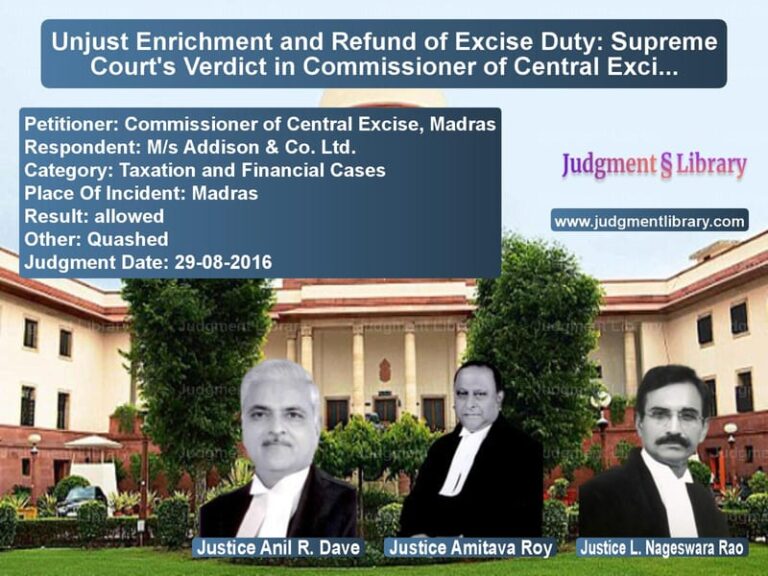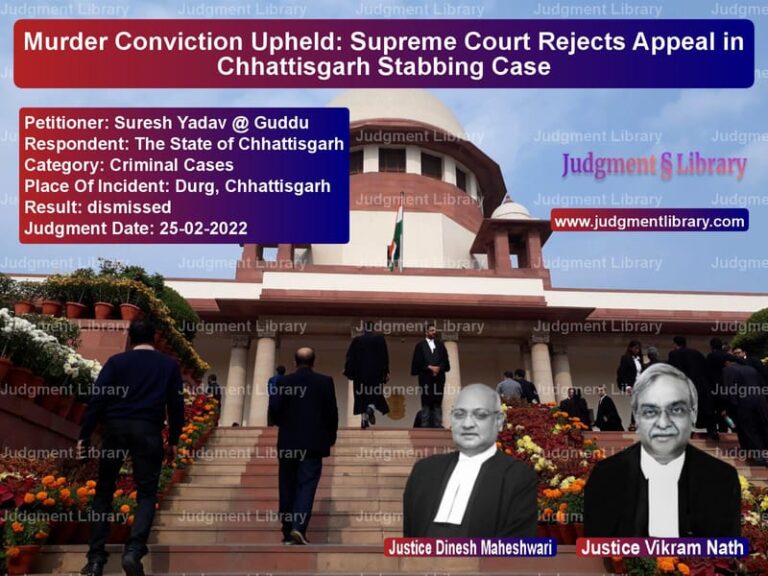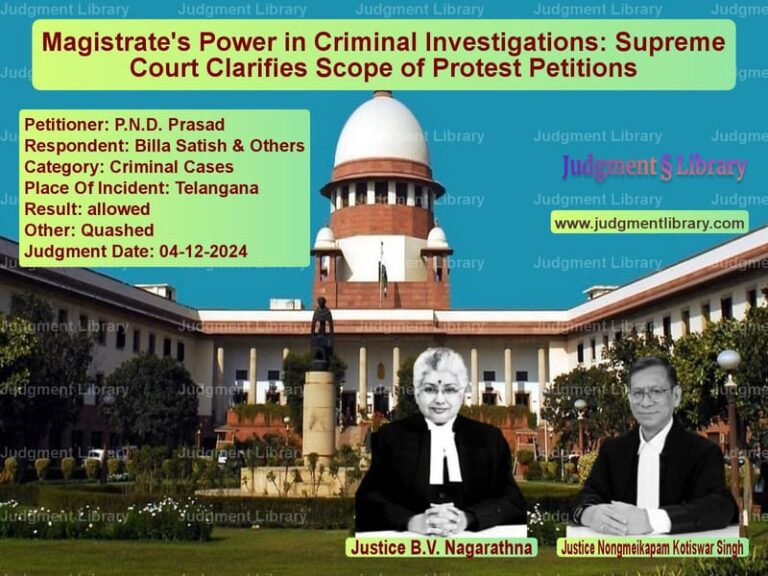Supreme Court Upholds Land Compensation: Union of India vs. Dyagala Devamma & Others
The case of Union of India vs. Dyagala Devamma & Others is a landmark Supreme Court judgment concerning compensation for land acquisition. The case arose when the Government of Andhra Pradesh acquired land in Jagitial Municipality, District Karimnagar, for a railway project. The primary question before the Court was whether the compensation awarded by the High Court was justified or whether the Railways’ challenge to the increased compensation was valid.
Background of the Case
On November 12, 2003, the State of Andhra Pradesh issued a notification under Section 4 of the Land Acquisition Act, 1894, to acquire land measuring 101 acres (Survey No. 398/3 and other connected survey numbers) for the Karimnagar-Jagitial railway broad gauge project. Following the notification, the government took possession of the land on December 2, 2003. The Land Acquisition Officer (LAO) then initiated proceedings to determine the compensation payable to landowners.
By Award No. 26/2006 dated July 14, 2006, the LAO fixed compensation at:
- Rs. 1,30,000 per acre for wet lands
- Rs. 1,24,000 per acre for dry lands
Additionally, compensation was awarded for structures, wells, and other improvements made on the land.
Legal Challenge and High Court Ruling
The landowners, dissatisfied with the compensation, filed a reference under Section 18 of the Land Acquisition Act before the Senior Civil Judge, Jagitial (Reference Court). The Reference Court issued an award on July 23, 2010, determining the market value at:
- Rs. 21,29,600 per acre for all land types
However, the Reference Court deducted 50% of the amount for development charges, thereby reducing the final compensation to Rs. 10,64,800 per acre.
Both parties appealed to the High Court of Andhra Pradesh. The High Court:
- Upheld the Reference Court’s valuation of Rs. 21,29,600 per acre.
- Reduced the deduction for development charges from 50% to 25%, thereby increasing the compensation to Rs. 15,97,200 per acre.
The Union of India, representing the Railways, appealed the decision, arguing that the compensation was excessive.
Arguments Before the Supreme Court
Appellant (Union of India/Railways) Arguments
- The High Court erred in further enhancing compensation to Rs. 15,97,200 per acre.
- The Reference Court’s decision to deduct 50% for development charges was appropriate given the underdeveloped nature of the land.
- The exemplar sale deed (Exhibit P-18) used for valuation pertained to a much smaller plot and was not a valid comparison.
- The acquired land lacked infrastructural advantages and had no direct access to major roads.
Respondents (Landowners) Arguments
- The market value of Rs. 21,29,600 per acre was based on valid sale deeds, and the High Court correctly reduced the development charge deduction.
- The land was adjacent to a fast-growing urban area and had significant potential for commercial use.
- The Railways had undervalued the land, and a fair compensation must reflect market realities.
Supreme Court’s Observations
The Supreme Court carefully reviewed past precedents, the facts of the case, and the applicable principles of land acquisition compensation. Key observations included:
- The Reference Court correctly determined the market value of the acquired land at Rs. 21,29,600 per acre.
- However, in cases where land is acquired in large parcels, a deduction for development charges is necessary.
- The exemplar sale deed (Ex. P-18) pertained to a much smaller piece of land, located in a developed area, whereas the acquired land was undeveloped.
- Typically, deductions range from 10% to 86% depending on the circumstances.
- The Reference Court’s decision to deduct 50% for development charges was reasonable and justified.
Final Judgment
The Supreme Court ruled in favor of the Railways and:
- Set aside the High Court’s order reducing development charge deductions to 25%.
- Restored the Reference Court’s ruling, which deducted 50% for development charges.
- Ordered that the final compensation to landowners should be Rs. 10,64,800 per acre.
Significance of the Judgment
This judgment reaffirms the principle that compensation in land acquisition cases must balance fair market value with appropriate deductions for development costs. The ruling establishes that:
- Courts must consider the undeveloped nature of large parcels of acquired land when determining compensation.
- Comparative sale deeds must be examined carefully to ensure fair valuation.
- Development charges should be deducted to reflect the costs of bringing acquired land up to market standards.
The Supreme Court’s ruling ensures that government projects can proceed without excessive financial burdens while also protecting the rights of landowners.
Petitioner Name: Union of India.Respondent Name: Dyagala Devamma & Others.Judgment By: Justice Abhay Manohar Sapre, Justice Uday Umesh Lalit.Place Of Incident: Jagitial Municipality, District Karimnagar, Andhra Pradesh.Judgment Date: 25-07-2018.
Don’t miss out on the full details! Download the complete judgment in PDF format below and gain valuable insights instantly!
Download Judgment: Union of India vs Dyagala Devamma & Ot Supreme Court of India Judgment Dated 25-07-2018.pdf
Direct Downlaod Judgment: Direct downlaod this Judgment
See all petitions in Property Disputes
See all petitions in Damages and Compensation
See all petitions in Public Interest Litigation
See all petitions in Judgment by Abhay Manohar Sapre
See all petitions in Judgment by Uday Umesh Lalit
See all petitions in allowed
See all petitions in Modified
See all petitions in supreme court of India judgments July 2018
See all petitions in 2018 judgments
See all posts in Civil Cases Category
See all allowed petitions in Civil Cases Category
See all Dismissed petitions in Civil Cases Category
See all partially allowed petitions in Civil Cases Category

